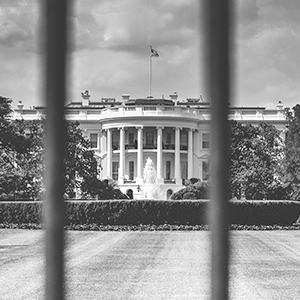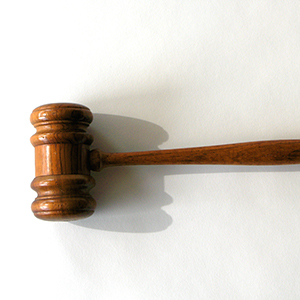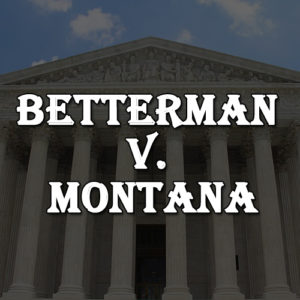Menu
Hot-Topics
February 19, 2026 | SCOTUS Reaffirms Fourth Amendment Standard for Police Responding to Household Emergencies
Category: Supreme Court Decisions

Murr v Wisconsin: Supreme Court to Clarify Regulatory Takings Under Fifth Amendment
Murr v Wisconsin is one of the October 2016 Term’s most-anticipated cases. The regulatory takings case will address whether two legally distinct but commonly owned contiguous parcels must be combined for takings analysis purposes. The Court’s dec...

Weston v City Council of Charleston: What Is a “Suit?”
In Weston v City Council of Charleston, 27 U.S. 449 (1829), the Supreme Court held that a city ordinance taxing interest-bearing stock of the United States was unconstitutional. The Court specifically found that the tax burdened the enumerated power ...

October 2016 Supreme Court Term Preview: Major Criminal Cases at Hand
The U.S. Supreme Court will return from its summer recess at the end of the month. The justices have already agreed to consider a number of significant criminal law cases over 2016-2017 Term. This post offers a brief preview. Bravo-Fer...

Willson v Black Bird Creek Marsh Company: The Dormant Commerce Clause
In Willson v Black Bird Creek Marsh Company, 27 U.S. (2 Pet.) 245 (1829), the U.S. Supreme Court held that a Delaware state law authorizing the building of a dam did not unconstitutionally usurp Congress's powers under the Commerce Clause because the...

Brown v Maryland: Import Taxes on Foreign Goods
In Brown v Maryland, 12 Wheat. 419 (1827), the U.S. Supreme Court held that a Maryland law requiring importers of foreign goods to obtain a license violated the Constitution’s prohibition on import taxes and undermined federal authority over inters...

Supreme Court Overturns Stun Gun Ban in Commonwealth v Caetano
In Commonwealth v Caetano, 577 U. S. ____ (2016), the U.S. Supreme Court held that a Massachusetts court’s proffered reasons for upholding a ban on personal possession or use of a “stun gun” contradicted the Court’s prior Second Amendment h...

Ogden v Saunders: The Contracts Clause
In Ogden v Saunders, 25 U.S. 213 (1827), the U.S. Supreme Court held that a New York bankruptcy law did not violate the Constitution’s Contracts Clause. The case is also most remembered as the only decision from which Chief Justice John Marshall...

Dietz v Bouldin Recognizes Judge’s Limited Authority to Call Back Jury
In Dietz v Bouldin, 579 U. S. ____ (2016), the U.S. Supreme Court held that the federal district court has a limited inherent power to rescind a jury discharge order and recall a jury in a civil case for further deliberations after identifying an err...

Wayman v Southard: The Limits of Non-delegation
In Wayman v Southard, 23 U.S. 10 Wheat. 1 1 (1825), the U.S. Supreme Court first grappled with the doctrine of non-delegation, under which one branch of government can’t delegate its constitutionally authorized power to another. In the decision, Ch...

Supreme Court Clarifies Speedy Trial Clause in Betterman v. Montana
In Betterman v. Montana, 578 U. S. ____ (2016), the U.S. Supreme Court clarified that the Sixth Amendment’s speedy trial guarantee does not apply once a defendant has been found guilty at trial or has pleaded guilty to criminal charges. The Court�...
Previous Articles
SCOTUS Decision in Bowe v. United States Is First of the 2026 Term
by DONALD SCARINCI on February 5, 2026
In Bowe v. United States, 607 U.S. ___ (2026), the U.S. Supreme Court held that Title 28 U.S.C. § ...
SCOTUS Rules State Can’t Immunize Parties from Federal Civil Liability
by DONALD SCARINCI on January 29, 2026
In John Doe v. Dynamic Physical Therapy, LLC, 607 U.S. ____ (2025) the U.S. Supreme Court held that...
Supreme Court to Address Racial Discrimination in Jury Selection
by DONALD SCARINCI onWhile the U.S. Supreme Court has concluded oral arguments for the year, it continues to add cases t...
The Amendments
-
Amendment1
- Establishment ClauseFree Exercise Clause
- Freedom of Speech
- Freedoms of Press
- Freedom of Assembly, and Petitition
-
Amendment2
- The Right to Bear Arms
-
Amendment4
- Unreasonable Searches and Seizures
-
Amendment5
- Due Process
- Eminent Domain
- Rights of Criminal Defendants
Preamble to the Bill of Rights
Congress of the United States begun and held at the City of New-York, on Wednesday the fourth of March, one thousand seven hundred and eighty nine.
THE Conventions of a number of the States, having at the time of their adopting the Constitution, expressed a desire, in order to prevent misconstruction or abuse of its powers, that further declaratory and restrictive clauses should be added: And as extending the ground of public confidence in the Government, will best ensure the beneficent ends of its institution.
Awards





